White rice is a staple food in many cultures around the world and is known for its versatility and convenience. But is it healthy to eat? In this article, we will explore the health benefits of white rice, including its fiber and nutrient content, and how it compares to brown rice.
Is White Rice Healthy to Eat?
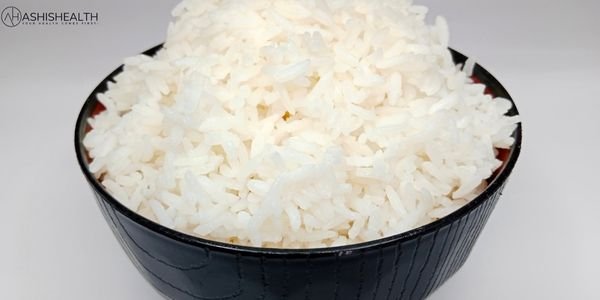
White rice is a staple food that is enjoyed by many people around the world. It is a good source of carbohydrates, which are the body’s main source of energy, and it is low in fat and calories. This makes it a great option for weight loss and maintaining a healthy diet. However, it is important to note that white rice is a refined grain, meaning it has had the outer bran and germ removed, which results in a loss of fiber and nutrients. Therefore, it is important to consume white rice in moderation and include a variety of whole grains in your diet for a balanced diet.
Fiber and Nutrients in White Rice
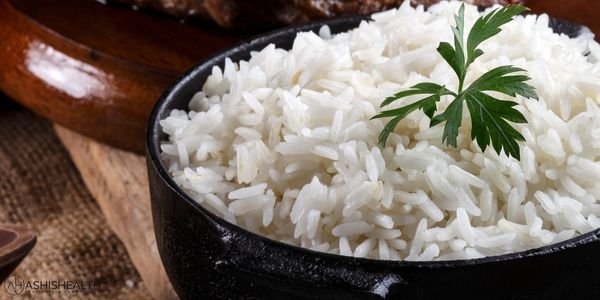
White rice is low in fiber compared to brown rice, as the refining process removes the outer bran and germ which are rich in fiber. However, it still contains small amounts of essential vitamins and minerals, including vitamin B6, iron, and magnesium. These nutrients are important for maintaining good health, but in lower amount than brown rice. To increase your intake of fiber and nutrients, it is recommended to consume a variety of whole grains, including brown rice, quinoa, and bulgur wheat.
How is White Rice Different from Brown Rice?
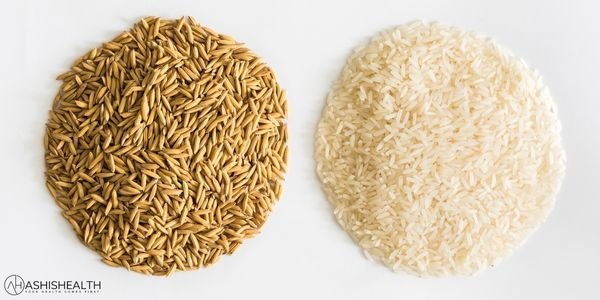
White rice and brown rice are both made from the same paddy rice plant, but they are different in terms of processing and nutritional content. White rice is made by removing the outer husk and bran layers of the rice grain, which results in a polished, white grain that is easy to cook and has a softer texture. It is also easier to digest compared to brown rice, making it a great option for people with sensitive stomachs.
On the other hand, brown rice is made by leaving the outer husk and bran layers intact, resulting in a chewier texture and a nuttier flavour. It contains more fiber, vitamins, and minerals than white rice because it is a whole grain. However, the outer bran and germ may cause the brown rice to be more difficult to digest and take longer to cook.
White rice is also a good source of carbohydrates, which are the body’s main source of energy, and it is low in fat and calories. This makes it a great option for weight loss and maintaining a healthy diet. Additionally, white rice has a low glycemic index, which means it can help to stabilize blood sugar levels.
Is Brown Rice Healthier than White Rice?
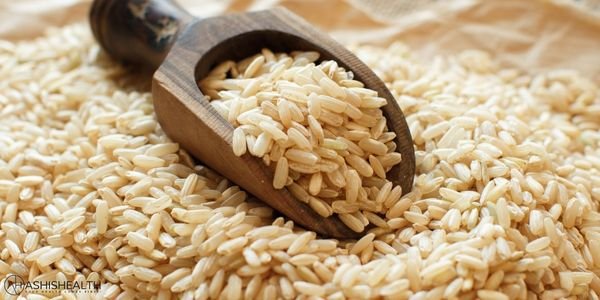
Both white and brown rice have their own set of benefits and drawbacks. White rice is a good source of carbohydrates, which are the body’s main source of energy, and it is low in fat and calories. This makes it a great option for weight loss and maintaining a healthy diet. Additionally, white rice has a low glycemic index, which means it can help to stabilize blood sugar levels.
On the other hand, brown rice is a whole grain and contains more fiber and nutrients, but it may be more difficult to digest and take longer to cook. In conclusion, both white and brown rice can be part of a healthy diet when consumed in moderation. Here are many health benefits of white rice.
Health Benefits of White Rice
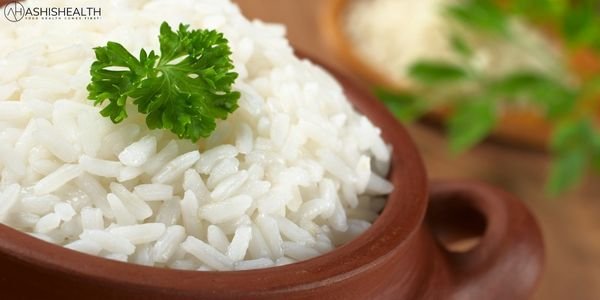
- Energy on the Go: White rice is a great source of carbohydrates, providing a quick and easy energy boost for those on the go.
- Digestive Aid: White rice is easy to digest, making it a great option for people with sensitive stomachs or those recovering from an illness.
- Blood Sugar Balancer: White rice has a low glycemic index, which helps to keep blood sugar levels stable.
- Heart-Healthy: White rice is low in fat and cholesterol, making it a great option for maintaining heart health.
- Gut-Friendly: Rice is a great option for keeping the gut healthy, as it is easy to digest and can help prevent constipation.
- Colon Care: White rice contains small amounts of magnesium, which is important for colon health.
- Bone, Nerve, and Muscle Support: White rice contains small amounts of essential vitamins and minerals, including vitamin B6, iron, and magnesium, that help to support bones, nerves, and muscles.
Benefits of White Rice
It’s a quick source of energy

White rice is a good source of carbohydrates, making it an excellent option for a quick energy boost. Carbohydrates are the body’s main source of energy, and they are essential for maintaining good health. When consumed, carbohydrates are broken down into glucose, which is then used by the body for energy. White rice is a great option for people who need a quick energy boost, such as athletes, or for people who are feeling tired or sluggish.
Rice is very easy to digest
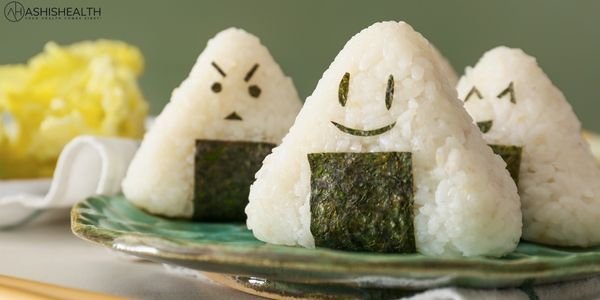
White rice is considered as a very easy to digest food. Rice is a staple food in many cultures around the world and is known for its versatility and convenience. White rice is easy to digest because it has been refined and polished, which removes the outer bran and germ. This process makes the rice grain smoother and softer, making it easier for the body to break down and absorb the nutrients.. For people with sensitive stomachs, or those recovering from an illness, white rice can be a great option as it’s easy to digest and gentle on the stomach.
It can stabilize your blood sugar levels

White rice can help to stabilize blood sugar levels due to its low glycemic index (GI). The glycemic index is a measure of how quickly a food raises blood sugar levels. Foods with a high GI are quickly absorbed and can cause a rapid spike in blood sugar, while foods with a low GI are absorbed more slowly and can help to keep blood sugar levels stable. White rice has a low glycemic index, which means it can help to keep blood sugar levels stable, this is particularly beneficial for people with diabetes or those looking to regulate their blood sugar levels.
Aids heart health

White rice can be beneficial for heart health as it is low in fat and cholesterol. Consuming a diet low in fat and cholesterol can help to reduce the risk of heart disease. White rice is also a good source of carbohydrates, which can provide energy and support heart function. Additionally, white rice contains small amounts of essential vitamins and minerals, such as magnesium and potassium which are important for maintaining a healthy heart.
Improves Colon Health

White rice can help to keep the gut healthy because it is easy to digest. Rice is a great option for people with sensitive stomachs or those recovering from an illness. The process of refining and polishing the rice grain makes it smoother and softer, which makes it easier for the body to break down and absorb the nutrients.
Supports Bones, Nerves, and Muscles

White rice contains small amounts of essential vitamins and minerals that are important for supporting bones, nerves, and muscles. For example, white rice contains small amounts of vitamin B6, iron and magnesium. Vitamin B6 helps in the formation of red blood cells and iron supports oxygen transportation in the body, while magnesium helps to maintain muscle and nerve function.
White rice can be a healthy addition to your diet when consumed in moderation. Despite its lack of fiber and nutrients compared to brown rice, it is a good source of carbohydrates, making it a quick energy source and easy to digest. Additionally, it can help to stabilize blood sugar levels, aid heart health and keep the gut healthy. But, you should also consider consuming other whole grains along with white rice for a balanced diet. These were all the benefits of white rice.
FAQs
Is eating white rice good for you?
White rice can be a healthy addition to your diet when consumed in moderation. It is a good source of carbohydrates and is low in fat and calories. However, it is a refined grain and has had the outer bran and germ removed, resulting in a loss of fiber and nutrients. To ensure a balanced diet, it’s important to also consume other whole grains and a variety of nutrient-dense foods such as fruits, vegetables and lean proteins. Additionally, it’s important to maintain a healthy lifestyle and regular exercise.
Is it OK to eat white rice everyday?
White rice can be part of a healthy diet when consumed in moderation, but it is not recommended to eat it every day.
What are the benefits of eating rice?
Eating rice can provide a number of benefits, including:
- Being a good source of carbohydrates, which are the body’s main source of energy
- Being low in fat and calories, making it a great option for weight loss
- Being easy to digest, making it a great option for people with sensitive stomachs
- Helping to stabilize blood sugar levels due to its low glycemic index
- Aiding heart health as it is low in fat and cholesterol
- Keeping the gut healthy as it is easy to digest and can help prevent constipation
- Supporting bones, nerves, and muscles due to the small amounts of essential vitamins and minerals it contains.
Is white rice a Superfood?
White rice is not considered a superfood. Superfoods are foods that are particularly high in nutrients and are believed to have health benefits beyond their basic nutritional value.
What are the disadvantages of white rice?
The main disadvantages of white rice are:
- It is a refined grain, which means it has had the outer bran and germ removed, resulting in a loss of fiber and nutrients.
- It has a higher glycemic index than brown rice, which means it can cause blood sugar spikes.
- It is not as nutrient-dense as brown rice, as it contains lower amounts of vitamins and minerals.
- Consuming too much white rice can contribute to weight gain if not balanced with other nutrient-dense foods and regular exercise.
- Eating a diet high in refined grains, like white rice, can lead to deficiencies in essential vitamins and minerals.
What happens if we eat rice daily?
Eating rice daily can provide a good source of carbohydrates, which are the body’s main source of energy. However, if it is not balanced with other nutrient-dense foods, such as fruits, vegetables, and lean proteins, it can lead to deficiencies in essential vitamins and minerals. Additionally, if eaten in large quantities, it can contribute to weight gain.
Also Read: 10 Foods to eat to help you lose weight


